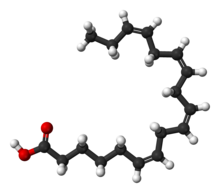Stearidonic acid

| |
| Names | |
|---|---|
| Preferred IUPAC name
(6Z,9Z,12Z,15Z)-Octadeca-6,9,12,15-tetraenoic acid | |
| Identifiers | |
3D model (JSmol)
|
|
| ChEBI | |
| ChEMBL | |
| ChemSpider | |
| ECHA InfoCard | 100.127.224 |
PubChem CID
|
|
| UNII | |
CompTox Dashboard (EPA)
|
|
| |
| |
| Properties | |
| C18H28O2 | |
| Molar mass | 276.420 g·mol−1 |
| Density | 0.9334 g/cm3 (15 °C) |
| Melting point | 200 °C (392 °F; 473 K) decomposition |
Except where otherwise noted, data are given for materials in their standard state (at 25 °C [77 °F], 100 kPa).
| |
Stearidonic acid (SDA: C18H28O2; 18:4, n-3) is an ω-3 fatty acid, sometimes called moroctic acid.
Biosynthesis
[edit]It is biosynthesized from alpha-linolenic acid (ALA: C18H30O2; 18:3, n-3) by the enzyme delta-6-desaturase, which removes two hydrogen (H) atoms.
Stearidonic acid is a precursor to eicosapentaenoic acid.[1]
As it is a precursor to other fatty acids, there has been efforts to enhance the content off stearidonic acid in various crops, such as soybeans.[2]
SDA is also a precursor to N-acylethanolamine (NAEs).[3][4] Natural sources of this fatty acid are the seed oils of hemp, blackcurrant, corn gromwell,[5] and Echium plantagineum, and the cyanobacterium Spirulina. SDA can also be synthesized in a lab. A GMO soybean source is approved by the European Food Safety Authority.[6]
See also
[edit]References
[edit]- ^ Calder, Philip C. (2012). "Mechanisms of Action of (N-3) Fatty Acids". The Journal of Nutrition. 142 (3): 592S – 599S. doi:10.3945/jn.111.155259. PMID 22279140.
- ^ Garg, Monika; Sharma, Natasha; Sharma, Saloni; Kapoor, Payal; Kumar, Aman; Chunduri, Venkatesh; Arora, Priya (2018). "Biofortified Crops Generated by Breeding, Agronomy, and Transgenic Approaches Are Improving Lives of Millions of People around the World". Frontiers in Nutrition. 5: 12. doi:10.3389/fnut.2018.00012. PMC 5817065. PMID 29492405.
- ^ Galasso, Incoronata; Russo, Roberto; Mapelli, Sergio; Ponzoni, Elena; Brambilla, Ida M.; Battelli, Giovanna; Reggiani, Remo (2016-05-20). "Variability in Seed Traits in a Collection of Cannabis sativa L. Genotypes". Frontiers in Plant Science. 7: 688. doi:10.3389/fpls.2016.00688. ISSN 1664-462X. PMC 4873519. PMID 27242881.
- ^ PubChem. "Stearidonic acid". pubchem.ncbi.nlm.nih.gov. Retrieved 2022-11-22.
- ^ "Corn Gromwell". NIAB. Archived from the original on 2011-07-04.
- ^ "Scientific Opinion on genetically modified soybean MON 87769". European Food Safety Authority. 2014-05-16. Retrieved 2019-02-18.
